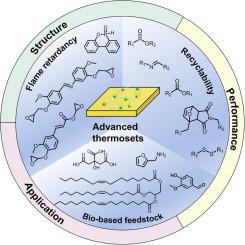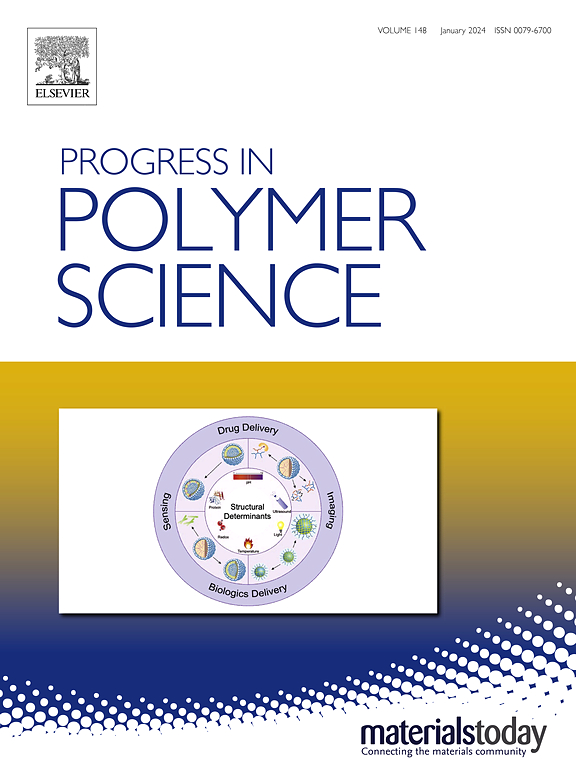Recyclable fire-retardant bio-based thermosets: From molecular engineering to performances and applications
IF 26.1
1区 化学
Q1 POLYMER SCIENCE
引用次数: 0
Abstract
Thermosets play a critical role in aerospace, automotive, electronics, and construction industries due to their mechanical strength, thermal stability, and chemical resistance. Advanced thermoset materials, such as epoxy resins, phenolic resins and unsaturated polyester resins, have significantly contributed to industrial innovation. However, these traditional thermosets heavily rely on petroleum-based resources and suffer non-recyclability and even high flammability. Last years have witnessed the use of many renewable chemicals for developing advanced bio-based thermosets with tunable physical properties, such as recyclability and reprocessability enabled by dynamic covalent chemistries, fire retardancy, mechanical and thermal properties. This review aims to summarize recent advances in recyclable, flame-retardant, bio-based thermosets, and highlights their molecular structures and design strategies for achieving high performances. We also discuss intrinsic flame-retardant modes of action, and degradation/recycling mechanisms based on dynamic covalent chemistry. Following discussions on their applications, some key challenges and opportunities are also proposed for the development of next-generation advanced thermosets. This work is expected to expedite the creation of high-performance recyclable thermosets and to advance the sustainability transition of traditional thermosets.


可回收阻燃生物基热固性材料:从分子工程到性能和应用
热固性材料由于其机械强度、热稳定性和耐化学性,在航空航天、汽车、电子和建筑行业中发挥着关键作用。先进的热固性材料,如环氧树脂、酚醛树脂和不饱和聚酯树脂,对工业创新做出了重大贡献。然而,这些传统的热固性材料严重依赖于石油资源,并且具有不可回收性和高可燃性。近年来,许多可再生化学品被用于开发具有可调物理性能的先进生物基热固性材料,例如通过动态共价化学、阻燃性、机械和热性能实现的可回收性和可再加工性。本文综述了可回收、阻燃、生物基热固性材料的最新研究进展,重点介绍了其分子结构和设计策略。我们还讨论了内在阻燃的作用方式,以及基于动态共价化学的降解/回收机制。在讨论了它们的应用之后,还提出了下一代先进热固性材料发展的一些关键挑战和机遇。这项工作预计将加快高性能可回收热固性材料的创造,并推进传统热固性材料的可持续性转型。
本文章由计算机程序翻译,如有差异,请以英文原文为准。
求助全文
约1分钟内获得全文
求助全文
来源期刊

Progress in Polymer Science
化学-高分子科学
CiteScore
48.70
自引率
1.10%
发文量
54
审稿时长
38 days
期刊介绍:
Progress in Polymer Science is a journal that publishes state-of-the-art overview articles in the field of polymer science and engineering. These articles are written by internationally recognized authorities in the discipline, making it a valuable resource for staying up-to-date with the latest developments in this rapidly growing field.
The journal serves as a link between original articles, innovations published in patents, and the most current knowledge of technology. It covers a wide range of topics within the traditional fields of polymer science, including chemistry, physics, and engineering involving polymers. Additionally, it explores interdisciplinary developing fields such as functional and specialty polymers, biomaterials, polymers in drug delivery, polymers in electronic applications, composites, conducting polymers, liquid crystalline materials, and the interphases between polymers and ceramics. The journal also highlights new fabrication techniques that are making significant contributions to the field.
The subject areas covered by Progress in Polymer Science include biomaterials, materials chemistry, organic chemistry, polymers and plastics, surfaces, coatings and films, and nanotechnology. The journal is indexed and abstracted in various databases, including Materials Science Citation Index, Chemical Abstracts, Engineering Index, Current Contents, FIZ Karlsruhe, Scopus, and INSPEC.
 求助内容:
求助内容: 应助结果提醒方式:
应助结果提醒方式:


